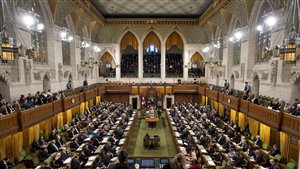Two more Conservative members of parliament are speaking out about the prime minister’s tight control over who gets to say what in the House of Commons. Five others spoke out last month when the party whip prevented MP Mark Warawa from reading a statement about abortion.

The prime minister has exerted control over other aspects of Parliament in ways scholars say erode MP’s ability to hold the government to account. The trend increasingly differentiates Canada’s parliament from those of Britain and other former British colonies with the same system of government.
The whip is the person who ensures party discipline and ensures there are enough members in the House during votes. It used to be the Speaker of the House who decided which member would ask questions during Question Period and who could make statements. Now the whips decide and in the case of the Conservative party, they even vet the members’ statements in advance.
“This gives the party leadership incredible control over what MPs get to say,” says Bruce Hicks, political scientist at Carleton University in Ottawa. “It’s severely hampered the ability of the House of Commons to be a representative institution. Really what happens in Canada, sadly, is that every four years there is an election and whichever party gets the majority gets to rule for four years and there’s very little accountability and representation that takes place in between.”
Canadians elect representatives in each riding who then form a government. They then oversee the workings of government and if they don’t like what’s happening they can defeat it through a non-confidence motion and there would be a new election. Those motions used to only apply to important legislation like the agenda, budgets or other major financial legislation. Hicks says recently governments have made virtually every piece of legislation a matter of confidence. This has served to muzzle MPs who don’t want to bring down the government at every turn.

“The oppositions are afraid to do that because the electorate doesn’t like the idea of spending millions of dollars on an election so close to one before,” says Hicks. “So a government is able to ram through legislation that isn’t supported by the majority of members by using these procedural tricks.”
The degree to which Canada’s prime minister has taken control of the powers of the governor-general is another criticism made by Hicks. “In Australia the governor-general frequently refuses the prime minister’s request to suspend the session or to call an election. In New Zealand…they’ve gone to the trouble of appointing jurists… because they bring an expertise that mediates two branches of government… In Canada the prime minister has increasingly picking people who would basically be yes men, who would agree to whatever the prime minister wants.”
Hicks points out that Prime Minister Stephen Harper used this power over the governor-general to suspend the session of parliament twice instead of facing the House. In one case he was facing a non-confidence motion, in the other questions about the Canadian military mission in Afghanistan.
“That is rather unique to Canada,” says Hicks. “None of the other former British colonies have that experience of a prime minister being so heavy-handed with the legislature.”
Scholars have criticized these trends in Canada’s parliament but Hicks says things are not likely to change unless a political party makes this an election issue, promises change, and is elected.







For reasons beyond our control, and for an undetermined period of time, our comment section is now closed. However, our social networks remain open to your contributions.